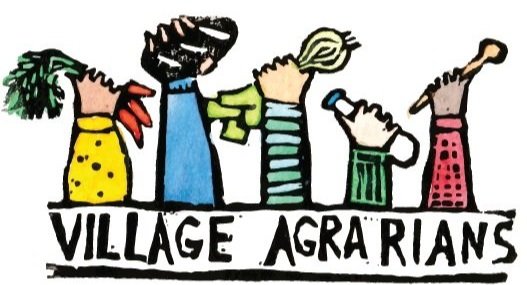Fergus, Jamie, and Lydia in the newly established BHU market garden with their trusty chook crew members.
Canterbury-based BHU Organic College Market Garden is a space for growing, learning and connecting with community. This model small-scale market garden has been recently established to teach organic, agroecological farming methods via experiential education and they have recently taken on two interns. We caught up with head farmer, Jamie Tucker, and interns Lydia and Fergus.
How did you (Jamie) get into growing?
After a few too many episodes of Anthony Bourdain: No Reservations, I was inspired to become a vegetable farmer! Without much direction, I ended up studying viticulture (grape growing) and enology (winemaking) in the Finger Lakes, NY, USA. After almost a decade working in the wine industry in several countries, I decided it was finally time to return to the original dream, and left winemaking to pursue a Diploma in Organic Agri-crop Production, jointly delivered by the BHU & Lincoln University. I haven’t left the BHU since then!
What's your current favorite plant/fruit/vegetable/flower etc to grow?
I love growing tomatoes- the season long commitment to pruning & trellising reminds me of my days working among the vines, and the cyclical/seasonal nature of the care and nurturing they require.
What do you like most about growing food for your community?
Whanaungatanga / The relationships we form with community members. We sell the majority of our veggies via subscription boxes, and I do most of the delivering, allowing the transaction to evolve into a relationship.
Can you tell us a bit about your new internship programme?
The Organic College Market Garden is a pilot project which aims to teach organic, agroecological farming methods via experiential education on a model small-scale market garden; participate in on-farm research to further promote organic, regenerative farming; and contribute to a thriving peer to peer agricultural extension network. The (paid) internship program was the main driver in establishing the OCMG - we wanted to provide an opportunity to bridge the gap between tertiary offerings, like the certificates The Organic College offers, and decision-making roles on farms. The role encapsulates lots of your typical farm-hand tasks like weeding and transplanting, but also includes plans for lessons in [real world] financial acumen and budgeting, crop planning, and marketing, etc.
This year we have two interns who are splitting the FTE role: Lydia and Fergus. Both are current students at The Organic College, and will join full time in December when classes are over. So far, they have been tasked with adopting thier own bed and deciding what to plant and why, when to plant it, and plans for irrigation, pest control, and harvest.
For the current interns, can you share why you were interested in this opportunity and what you hope to get from the experience?
Lydia - “Because it is an incredible one! The chance to continue learning with Jamie is pretty special. She is incredibly generous with her knowledge and time - I grabbed the chance to absorb all I can! I was also pretty keen to prolong my time at the BHU They've been an inspiration for so many for 40+ years - I'm not ready to leave yet!
I hope to gain hands on experience in Agroecology, Regen Ag, sustainable human scale farming and minimal-till. Surely, this is the way forward! I hope to gain knowledge of the whole system (not just the parts I've been privy to as a Harvest Assistant on a large organic farm. OCMG has just begun - we're extra fortune to be part of the whole lifecycle of the farm, right from the very beginning. I am also hoping for clarity. I'm new to this farming world - where do I fit in?”
Fergus - “Kia ora! I'm Fergus. I've been interested in growing food for a long while, but as a perennnial renter I haven't had the security to invest in a garden of my own. So for all the theory I've accumulated over the years, I've had very little practical experience -- the BHU provides both in spades.
The new internship in particular lets us novices be across all areas throughout the whole growing season -- this applies to the business and planning side of things as much as it involves getting hands dirty. Jamie is an incredible mentor, whose patience is matched by her enthusiasm, knowledge and tirelessness. And with the wider access to the expertise and resources at the BHU, there would be few similar opportunities to learn so much on the job. I'm just hoping my body and mind can keep up to take it all in!
Blue skies”
Are there ways that other people can get involved with what you're doing?
We offer weekly working bees, which currently run Thursdays from 12-3.
With our limited resources, we also welcome community members with specific skills to donate time/skills i.e. marketing specialists, plumbers, professional grant writers, etc.
Another way to support our mahi is to share our work with the world!
Do you have a seasonal recipe you can share?
I do absolutely zero recipe development myself, though I’m an avid cookbook reader/tester and food blog follower. This past year my go-to cookbook was Six Seasons by Joshua McFadden, and my most frequently visited online food spot was The Guardian Food section.
Here's a link to a recipe I'm sharing with our veggie box subscribers this week: https://cookieandkate.com/spring-carrot-radish-and-quinoa-salad-with-herbed-avocado/

















